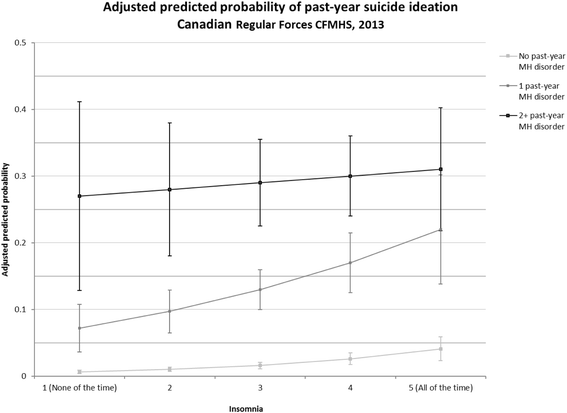Insomnia, psychiatric disorders and suicidal ideation in a National Representative Sample of active Canadian Forces members
- PMID: 28583100
- PMCID: PMC5460415
- DOI: 10.1186/s12888-017-1372-5
Insomnia, psychiatric disorders and suicidal ideation in a National Representative Sample of active Canadian Forces members
Abstract
Background: Past research on the association between insomnia and suicidal ideation (SI) has produced mixed findings. The current study explored the relationship between insomnia, SI, and past-year mental health status among a large Canadian Forces (CF) sample.
Method: Data was obtained from the 2013 Canadian Forces Mental Health Survey (CFMHS), and included a large representative sample of Canadian Regular Forces personnel (N = 6700). A series of univariate logistic regressions were conducted to test individual associations between past-year mental health status, insomnia, and potential confounds and SI. Mental health status included three groups: 0, 1, or two or more probable diagnoses of posttraumatic stress disorder (PTSD), major depressive disorder (MDD), generalized anxiety disorder (GAD), panic disorder (PD) and alcohol abuse/dependence. Stepwise multivariate logistic regression was used to assess the relationship between insomnia and SI with mental health status as a moderator.
Results: 40.8% of respondents reported experiencing insomnia. Both insomnia and number of mental health conditions incrementally increased the risk of SI. However, past-year mental health status was a significant moderator of this relationship, such that for CF personnel with either no (AOR = 1.61, 1.37-1.89) or only one past-year mental health condition (AOR = 1.39, 1.12-1.73), an incremental increase in insomnia was associated with an increased likelihood of SI. However, in personnel with two or more past-year mental health disorders, insomnia was no longer significantly associated with SI (AOR = 1.04, 0.81-1.33).
Conclusions: Insomnia significantly increased the odds of SI, but only among individuals with no or one mental health condition. Findings highlight the importance of assessing insomnia among CF members in order to further suicide prevention efforts.
Keywords: Depression; Insomnia; Mental health; Military; Posttraumatic stress disorder; Sleep; Suicidal ideation.
Figures
References
-
- Harrell MC, Berglass N: Losing the battle: the challenge of military suicide. Policy brief. In. Edited by Security CfaNA. Washington, DC; 2011
-
- Thompson JM, Zamorski MA, Sweet J, VanTil L, Sareen J, Pietrzak RH, Hopman WH, MacLean MB, Pedlar D. Roles of physical and mental health in suicidal ideation in Canadian Armed Forces regular Force veterans. Can J Public Health. 2014;105(2):e109–e115. doi: 10.17269/cjph.105.4217. - DOI - PMC - PubMed
-
- Ursano RJ, Heeringa SG, Stein MB, Jain S, Raman R, Sun X, Chiu WT, Colpe LJ, Fullerton CS, Gilman SE et al: Prevalence and Correlates of Suicidal Behavior among New Soldiers in the U.S. Army: Results from the Army Study to Assess Risk and Resilience in Servicemembers (Army Starrs). Depress Anxiety 2015, 32(1). - PMC - PubMed
MeSH terms
LinkOut - more resources
Full Text Sources
Other Literature Sources
Medical
Miscellaneous


